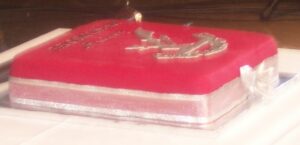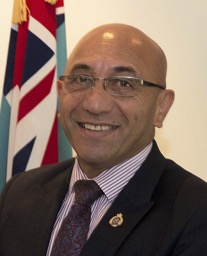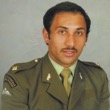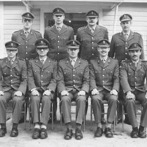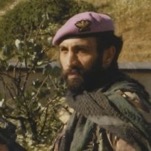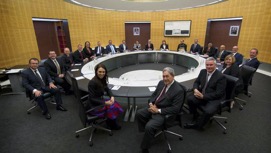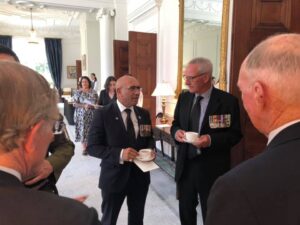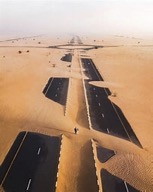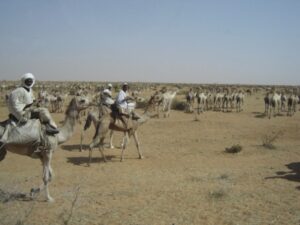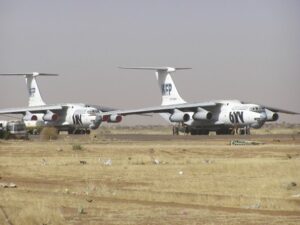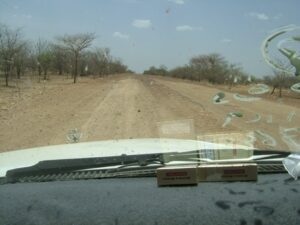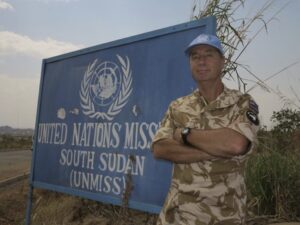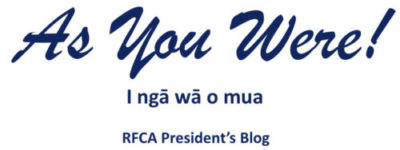
Dear Clubbies - Happy RF Cadet School Birthday for the 15th July - the date the School was officially formed in 1948. (Quite an auspicious year, really - the same year I was born!)
The first Class to march-in at Trentham Camp was Miles Company (Miles and Mead were called companies and not classes). One of the iconic photos in our history book, A Favoured Few, is of a group of Miles Company Cadets about to march away from the Q Store with their newly issued kit. Don't they look excited! I'm sure that, like me,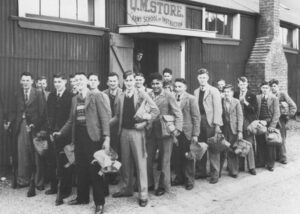 you remember your first visit to the Q Store and getting lumbered up with all your gears, though that never made up for having all your civvies locked away so you could take them home on your first leave!
you remember your first visit to the Q Store and getting lumbered up with all your gears, though that never made up for having all your civvies locked away so you could take them home on your first leave!
In this post we pay tribute to Ron Mark and include a piece by Kerry Adkins, Andrew VC class, about his post-Army experience working for a company creating supply chains for United Nations troops coming into Sudan in 2004. Thanks Kerry!
The Honourable Major Ron Stanley Mark, SSF, SOEME, RNZEME, Upham Class, Minister of Defence & Minister for Veterans Affairs
 Ron was born in Masterton on 29 January 1954. From an early age he and his brother were wards of the state and were fostered with
Ron was born in Masterton on 29 January 1954. From an early age he and his brother were wards of the state and were fostered with
several families in Pahiatua. Ron’s comment on his early years: “I wouldn’t have survived without them.” 1n 1971 Ron enlisted into the Regular Force Cadet School as a member of Upham Class.
He graduated into the RNZEME as a vehicle mechanic in December 1971 and was posted to Linton.
After completing trade and promotion courses to sergeant Ron attended the NZ Commissioning Course at OCTC as a corporal in 1978. He was commissioned as a 2nd lieutenant in December 1978.
In 1982 as a 2nd lieutenant he successfully completed the NZ SAS Selection Course. During his service in the NZ Army he served with 3 and 10 Transport Regiments, RNZCT, Queen Alexandra’s Mounted Rifles, RNZAC, and 2/1 Battalion, RNZIR.
In 1982 Ron was posted for a 13-month Tour of Duty to the Multi-National Force and Observers in the Sinai Peninsula as an acting captain. After three months his Uruguayan boss was removed and he was elevated to the Senior Staff Officer Maintenance (Ground), a grade 2 appointment. Thereafter the appointment was re-nationalised for New Zealanders in the rank of major. For his service in the Sinai Ron was awarded the Distinguished Service Order by the Director General of the MFO.
Despite requesting a posting to the NZSAS on several occasions a posting order never eventuated. In frustration Ron took his discharge from the NZ Army in 1985.
 As a captain Ron was contracted to the Sultanate of Oman’s Land Forces Headquarters as a technical staff officer in Headquarters EME from 1985 to 1986. Between 1986-1990 he was then contracted to the Sultan’s Special Force becoming OC of their EME Workshops. For his efforts Ron was awarded the Order of the Special Royal Emblem (Oman).
As a captain Ron was contracted to the Sultanate of Oman’s Land Forces Headquarters as a technical staff officer in Headquarters EME from 1985 to 1986. Between 1986-1990 he was then contracted to the Sultan’s Special Force becoming OC of their EME Workshops. For his efforts Ron was awarded the Order of the Special Royal Emblem (Oman).
 Other New Zealanders were also serving in the Omani Defence Force at the time including Major John Tinsley, another Upham Class ex-cadet. Formerly NZSAS and an OCTC Sword of honour graduate, John had also been commissioned into the Sultan’s Army serving in the Sultan of Oman’s Artillery training recruits as well as in the Western Frontier Regiment, a Baluchistani Battalion on the Saudi/Yemen Border.
Other New Zealanders were also serving in the Omani Defence Force at the time including Major John Tinsley, another Upham Class ex-cadet. Formerly NZSAS and an OCTC Sword of honour graduate, John had also been commissioned into the Sultan’s Army serving in the Sultan of Oman’s Artillery training recruits as well as in the Western Frontier Regiment, a Baluchistani Battalion on the Saudi/Yemen Border.
Between 1990 and 1996, Ron was a commercial consultant, ran an import and export business, and owned and operated Daytona Park in Christchurch, a family leisure and entertainment business.
Politics
In the 1993 election Ron was the Labour candidate for the Selwyn electorate and was later involved in the discussions about the formation of the New Zealand Democratic Coalition. When these failed, he joined New Zealand First.
He was a list MP from the 1996 election until his party's failure to retain any seats in the 2008 election. During the (1996–98) coalition between New Zealand First and the National Party, he was New Zealand First’s Senior Whip and the government's Junior Whip.
Once a soldier! The New Zealand television channel TV3 was banned for three days from filming in Parliament in August 2006 for showing Ron repeatedly giving the finger to another MP.
Mayor of Carterton
In 2010, Ron was elected Mayor of Carterton in the Wairarapa. In the 2013 local elections, Ron was returned unopposed.
Return to National Politics, 2014–2020
Ron stood as a New Zealand First candidate at the 2014 general election, finishing third in the Wairarapa electorate. He resigned as Mayor of Carterton as his placing on the New Zealand First list saw him returned to Parliament.
On 3 July 2015 he replaced Tracey Martin as deputy leader of New Zealand First.
During the 2017 election Ron was re-elected into Parliament on New Zealand First's party list.
Following the 2017 general election, Ron was appointed Minister of Defence and Veterans Affairs following the formation of a coalition government consisting of the Labour Party, New Zealand First, and the Green Party.
During the 2020 general election held on 17 October all the NZ First MPs lost their seats and Ron retired from politics for good. On 9 November 2020, Ron was granted retention of the title ‘The Honourable’ for life, in recognition of his term as a member of the Executive Council.
Post Politics
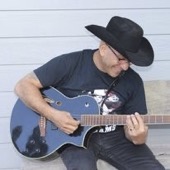 Ron has resigned from NZ First and will not return to politics at either the local or national level. His spare time will be spent improving his property in the Wairarapa and enjoying making music and spending time with his family.
Ron has resigned from NZ First and will not return to politics at either the local or national level. His spare time will be spent improving his property in the Wairarapa and enjoying making music and spending time with his family.
Ron progressed from a ward of the state to be commissioned in the NZ Army and also held a commission in the Omani Defence Force. Following his military service, he became one of this country’s most senior politicians. His success at both local and national politics is an unprecedented journey among our cohort.
During his tenure as the Minister of Defence he achieved much for the Defence Force, the first minister in many years to do so. As the Minister for Veteran’s Affairs he also strenuously supported veterans.
Ron has made a place for himself that is unique in the history of the Regular Force Cadet School, an exemplar extraordinaire. Forte Fortuna Juvat.
Thanks to Bob Davies for coordinating this tribute.
Sudan - Control by the United Nations
A tale by Kerry Adkins, Andrew VC
I graduated from the RF Cadets with a catering apprenticeship. The incident that follows was with a company I was working for in Asia and the Middle East after I retired from the Army.
A story of her experience in Juba, South Sedan, written by Lt Col Melanie Childs (RF Cadet FB, 13 April 2021), moved me to write of my experiences of two countries born from one but now both of such difference.
I worked there as an employee for a company based in Cyprus, creating supply chains for United Nations troops coming into Sudan in 2004. The troops involved were from South Africa, Pakistan, Bangladesh along with a combined but mixed African armed force. Their culinary requirements were therefore vast. No food was allowed to be purchased by us in Sudan as it might cause food shortages or price increases that could adversely affect the entire population. The UN would not allow that to happen.
Most of the food came from Holland where our warehouses were located. Fresh fruit and vegetables were purchased from Saudi Arabia. That came in through Port Sudan on the Red Sea courtesy of a very militant Sudanese union group. I had meetings with the Union Leader in the hospital in Port Sudan where he was undergoing major surgery. Regardless, he would not allow anybody else to take his place. However, he was extremely easy to deal with because he wanted the system to work. The same couldn’t be said for the South Sudanese Federal Minister of Labour who would not allow me to bring in staff to manage the food stores that we had to build and then operate for its distribution. The chaos that would result by placing Sudanese Managers in a warehouse full of food the variety of which they have never seen in their lifetime along with their starving family and friends on the other side of the wire could just be imagined. The meeting with the Sudanese Federal Minister of Labour ended up in a swearing competition about how much we loved each other. I got the visas through the UN!
Throughout most of its existence Sudan had been controlled by Britain or Egypt. In Khartoum, you could see the remnants of the British influence. Khartoum was where the White Nile and Blue Nile converged to form the mighty Nile River that flowed through to Egypt. President Bashier of Sudan ruled with an iron hand. Sudan itself was Islamic whereas South Sudan was largely Christian. The South also had oil which President Bashier wanted for his economy. Before partition rebels who owed allegiance to neither side roamed the border area between the north and south adding further to the mayhem.
Terrorists laid land mines around Juba where a Bangladeshi contingent was based. As a result pedestrians or road traffic could not enter he city. Dachshund bomb dogs were used to sniff out the landmines. However, they could only work in summer as torrential rains in winter flooded the area moving the mines as the ground was mainly sand. Consequently all food had to be flown into Juba by air. In 2004 the cost in NZ of a litre bottle of water was around $3.50. We were charging the United Nations US$15.00 with each soldier being rationed at 5 litres per day. Water was just one component of the ration supply chain. Another was dog food for the dachshunds.
Nature certainly added to our problems. Temperatures ranged around 48 – 50c although the lack of humidity made it bearable. In Kuwait, if the temperatures officially reached 50c all road workers and cleaners had to head indoors. The official temperatures therefore never rose above 49c! During torrential rainfalls one could not see a meter in front. Sandstorms were something else. A huge black cloud, from the ground to the sky, would herald its arrival. Within minutes, the flying dust blocks all vision and roads can’t be seen. The white line disappears and dust gets into everything. Once the sandstorm fades away the dust just settles then hangs around for days making driving extremely hazardous. I always employed a local driver whether in the city or the countryside. Kill a local in an accident and a foreigner is guilty regardless of who was in the wrong: ‘if you had not been in the country then the accident would not have happened’!
The local Sudanese men wear a white head-dress (like a T-towel) that is held in place with black elastic bands. The bands are used to put on the camels’ front feet in a figure 8 so that they can’t run away during a sandstorm or at any other time for that matter. The headdress also keeps the sand out of the Sudaneses’ eyes.
Because of the war, roads are second and third class. Bombing caused huge potholes and Sudan didn’t have the infrastructure to complete repairs. Driving anywhere outside of Khartoum was always a long drive. Like Australia, it is a huge country and with my driver in our trusty Toyota we set off for El Obeid. To my horror, we were overtaken by two 1957 Austin trucks, both in mint condition for working trucks. I asked my driver if the 2002 Toyota had a sick engine and pointed to the two trucks that overtook us. He didn’t understand my poor sense of humour and it was too early in the morning to explain.
Credit cards in Sudan are non-existent and every transaction is done in cash. The Sudanese Pound was worthless (I x Sudanese Pound = NZ $ 0.33) so it required carrying around a suitcase full of paper money to pay for hotels and meals. There were 8 in the team working out of different cities. I had to have those in Khartoum walk with me as safety guards in case of robbery. Working with these guys as we rotated through our roster was remarkably interesting. Some were Aussies who were ex-military from Iran. While walking through Khartoum if a car being driven by a single male was heading our way they were gone! Old habits never die. In Iran a car driven by a single male could be a bomb on 4 wheels targeting foreigners. I was never aware of any car bombs in Khartoum but our European faces stood out like the proverbial dog’s entanglements in the Sudanese capital.
We worked a reasonably tight roster: three months on (120 days continuous) then two weeks off and it had to rotate through the group so that decisions were kept within those that had completed the groundwork. On departing Khartoum by Emirates there was an immediate plea to the Cabin Crew for beer or wine. Sudan, being Islamic, is dry unless you join the black market and pay a fortune for alcohol. A Lebanese guy who was managing another branch of our company and his assistant were caught with two local women and beer in their house. They were in court and sentenced to 50 lashes of the rotan. Taken straight from Court to the cells below, hands cuffed to the ceiling, it began. They had to bathe to get their shirts and singlets off. It wasn’t pretty. Both were given fictitious passports by the joint venture company they were working for then shipped out of the country before somebody else could shop them to the authorities.
At around 0530 every morning UN aircraft would fly out of El Obeid heading for Darfur to drop food for those starving because of rebel activity. Apparently as the food drops occurred the rebels in Darfur picked up the food and then on sold it to the locals. We had to do food drops for the troops stationed in the Southwest of Sudan because trucks were often high- jacked on the roads around Raga and the surrounding areas.
Khartoum, being the capital was occupied by beggars, thieves, and every other category of evil. We never carried small arms as being caught would result in prison. So the eyes had to be sharp. The beggars and limbless would approach the van whenever they saw a European face. My driver in Khartoum, an Egyptian, would never let me give them money. ‘Give them food as they can eat that’. Any money they are given is handed on to their pimp. They get 10%. To see a young girl with a walking stick cut from a tree because her leg had been blown off by a landmine was heartbreaking.
The Hotel Sahara where we stayed was something out of the 1940’s. The management saw our group as a gift from god. But we all thought he was punishing us for our sins of which there were probably 1,000’s. Imagine a hotel room in the days of Laurel and Hardy. This was it. The shower tube was attached to the taps but the tube was less than a metre long so we had to scramble on hands and knees to get washed. Arriving back to our homes with all the necessities of life was most appreciated.
However, the whole project never really got off the ground. One of the US news channels did an investigative piece and discovered US$ 1 million in someone’s personal bank account. So, for a year and a half’s work the pay had been brilliant but alas with zero results to show for it. Another company was appointed to take over. I returned home and found my accountant had gone bust. Not only that but he had failed to tell me that because I owned property and a car in NZ I was liable for NZ tax which wasn’t paid. Alas, a year’s salary gone to those socialists in need but the experience as a whole was one in a million.
This photo was taken in Dubai after a sandstorm. As can be seen the roads are dangerous especially when travelling at speed.
In April 2016, South Sudan was born as a new country.
Answer to last month's RF Cadet School Trivia Question
Last month we asked the question "Who was the third Crump Class Cadet we have paid tribute to in the As You were! posts? You would have been able to name Warwick McCallion and Matt Te Pou from reading the June post. The third one was Craig Cocker, who we featured in September 2020.
